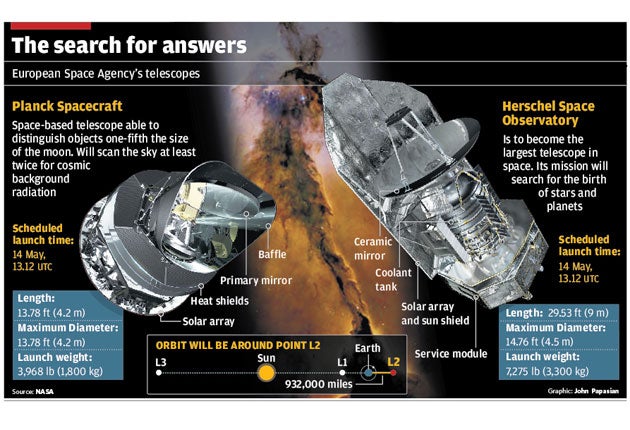Telescopes that could see the future
Scientists hope probes to be launched soon will help them predict how the Universe may end

Your support helps us to tell the story
From reproductive rights to climate change to Big Tech, The Independent is on the ground when the story is developing. Whether it's investigating the financials of Elon Musk's pro-Trump PAC or producing our latest documentary, 'The A Word', which shines a light on the American women fighting for reproductive rights, we know how important it is to parse out the facts from the messaging.
At such a critical moment in US history, we need reporters on the ground. Your donation allows us to keep sending journalists to speak to both sides of the story.
The Independent is trusted by Americans across the entire political spectrum. And unlike many other quality news outlets, we choose not to lock Americans out of our reporting and analysis with paywalls. We believe quality journalism should be available to everyone, paid for by those who can afford it.
Your support makes all the difference.A pair of space telescopes to be launched later this month will help to answer some of the biggest questions in the Universe – such as how did we get to where we are now, and where are we likely to end up.
Each telescope is designed to probe the deepest recesses of space to unravel the origins of matter, from the earliest beginnings of the Universe some 13.7 billion years ago to the creation of the stars, galaxies and planets.
One of the telescopes, called Planck, will study in unprecedented detail the ancient "fossilised" radiation left over as a relic of the Big Bang. The analysis could help to explain how the Universe formed through a process of rapid expansion, called inflation, in the first fractions of a second after the Big Bang itself.
The other telescope, called Herschel, will concentrate on the invisible, infrared radiation emitted by the star-forming regions of the galaxies in the hope of explaining how stellar objects, from stars like the Sun to planets such as Earth, can form from clouds of cosmic gas, dust and debris.
Scientists involved in the twin mission hope that the data gleaned from instruments on board each telescope will enable them to fill in the remaining mysteries of how the Universe came into existence, how it evolved and how it is likely to end – if indeed it ever will.
"We're looking at the physics at the very beginning of the physical universe," said Professor David Southwood, director of science at the European Space Agency, which is scheduled to launch the satellites from its station in Kourou, French Guyana on 14 May. Instruments on board the Planck telescope, named after the German physicist Max Planck, will be kept at minus 272.7C – just 0.3 degrees above absolute zero – in order to detect the cosmic background radiation left over from the Big Bang.
"These results will allow us to test our theories of the Big Bang and could completely change our understanding of the origin and development of our Universe and even predict its future," said Professor George Efstathiou of Cambridge University.
"By understanding the process of inflation, we make contact with fundamental physics."
Herschel, meanwhile, will gather infrared radiation emitted from the vast dust clouds of space where stars and galaxies are forming. With its 3.5-metre-wide mirror, Herschel will be the biggest telescope in space, said Professor Matt Griffin of Cardiff University.
"The results could reveal how stars like the Sun are forming in our own galaxy today, how the galaxies grew and evolved over cosmic time, and how planetary systems can develop from the dust and gas around young stars," Professor Griffin said.
Both telescopes will be launched on the same Arianne V rocket, which will take them to their final, and separate, resting orbits about 1.5 million kilometres (930,000 miles) from Earth.
It will take about six months before the first data is received at a listening station built near a monastery in Western Australia, 125 miles from Perth.
Join our commenting forum
Join thought-provoking conversations, follow other Independent readers and see their replies
Comments